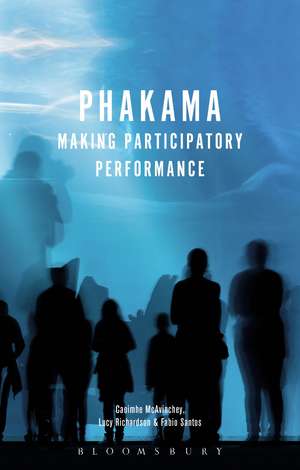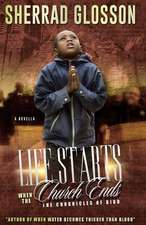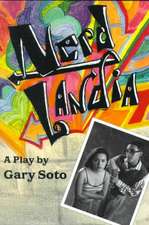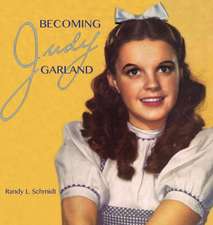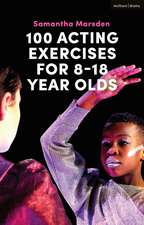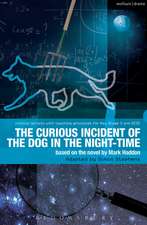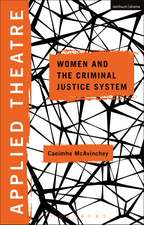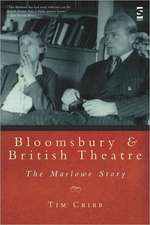Phakama: Making Participatory Performance
Autor Dr. Caoimhe McAvinchey, Fabio Santos, Lucy Richardson Ilustrat de Andrew Siddallen Limba Engleză Paperback – 21 feb 2018
| Toate formatele și edițiile | Preț | Express |
|---|---|---|
| Paperback (1) | 179.98 lei 3-5 săpt. | |
| Bloomsbury Publishing – 21 feb 2018 | 179.98 lei 3-5 săpt. | |
| Hardback (1) | 540.96 lei 6-8 săpt. | |
| Bloomsbury Publishing – 21 feb 2018 | 540.96 lei 6-8 săpt. |
Preț: 179.98 lei
Preț vechi: 208.35 lei
-14% Nou
Puncte Express: 270
Preț estimativ în valută:
34.44€ • 35.96$ • 28.44£
34.44€ • 35.96$ • 28.44£
Carte disponibilă
Livrare economică 25 martie-08 aprilie
Preluare comenzi: 021 569.72.76
Specificații
ISBN-13: 9781350044456
ISBN-10: 1350044458
Pagini: 288
Ilustrații: 10 bw illus
Dimensiuni: 156 x 234 x 23 mm
Greutate: 0.41 kg
Editura: Bloomsbury Publishing
Colecția Methuen Drama
Locul publicării:London, United Kingdom
ISBN-10: 1350044458
Pagini: 288
Ilustrații: 10 bw illus
Dimensiuni: 156 x 234 x 23 mm
Greutate: 0.41 kg
Editura: Bloomsbury Publishing
Colecția Methuen Drama
Locul publicării:London, United Kingdom
Caracteristici
Unprecedented access to the working practices of Phakama that situates the work of the company within a wider context of collaborative, participatory arts practices with young people internationally
Notă biografică
Lucy Richardson is Senior Lecturer in Performing Arts at London Metropolitan University and one of the early members of Phakama. Her research interest, which includes both traditional and performance research, is in 'creative processes and the politics of participation'. She established The Facility: Research Centre in Creative Practice at London Met to champion practice based research. Fabio Santos is the former Artistic Director of Phakama and a contributing writer on a collaboratively written handbook of transitional arts practice, led by Lucy Neal.Caoimhe McAvinchey is Senior Lecturer in Drama, Theatre and Performance Studies at Queen Mary University London and has published research reports, academic articles and books within the field of applied and social theatre.
Cuprins
AcknowledgementsContributorsList of IllustrationsForward by Mandla MbothweINTRODUCTIONPhakama Projects (1996-2006)TimelinePART ONE: PREPARING THE GROUNDIntroduction to Preparing the GroundHostingIntroduction Phakama Practice: Cultural ToursPhakama Practice: Cultural Tours - How ToThe Practical Politics of CareCase Study: The Child I Curry (Lesotho, 2003) by Selloane Mokuku Give and GainIntroduction Phakama Practice: Give and GainPhakama Practice: Give and Gain - How ToCultural Contexts: South Africa and Ubuntu, Progressive EducationCase Study: Bulang Dikgoro/ Open the Gates (South Africa, 1996 - 1997) by Tony Fegan.Interview: 'Give and Gain: Twenty Years Later' with Mildrett Stevens, Tracey Ligate and Sharon Waverly (Phakama South Africa)Cultural SharingIntroduction: Working TogetherPhakama Practice: Mapping the WorldPhakama Practice: Mapping the World - How ToDifficult CooperationCase Study: Be Yourself (Phakama SA and Phakama UK, Tricycle Theatre, London, 1999) by Caroline Calburn Interview with Maylene Catchpole (Phakama UK)Essay: 'When Time Is Not (2008): Artistic Exchange between Project Phakama UK and the Creative Arts Team (New York City)' by Ananda Breed. PART TWO: MAKING THE PERFORMANCEIntroduction to Making the PerformanceLayered Co-AuthorshipWorking with Site and Found MaterialsHosting The Audience Interview with James Hadley, Phakama Relationship Manager, Arts Council England (2008-2014).Essay: 'Catalytic Conversations: The aesthetic weave and social weft of Phakama's creative practice' by Sara MatchettCase Study: The Phakama Way, Pune, India (2002) by Vidyanidhee VanareseThe Street Is My Backyard, Buenos Aires, Argentina (1996), Charlotte Higgins, The Guardian, Monday 17 April 2006 PART THREE: CELEBRATIONIntroduction to CelebrationConnectingIntroduction Case Study: The Edible Garden (UK, 2012-2016) by Corinne MicallefBeing IntroductionEssay: 'Alive to the Music of What's Happening' by Lucy NealStepping UpIntroduction Interviews with: Jake Boston Sam Quinn Juancho Gonzalez Cedoux Kadima Liesl Hartman Jean September Alpha Thiam Beverley Randall Clinton Osborne and Mpotseng Shuping Luvuyo Mabuto and Craig Koopman Introduction to 'Performing Risk'Essay: 'Performing Risk' by Shirley Brice Heath.EPILOGUE INDEX
Recenzii
Provides a valuable insight into how Phakama's practice builds a collaborative ethos from the ground up ... the book weaves a rich tapestry of experiences from facilitators and participants into a critical context.
Phakama has been on a long journey of discovery and creating a space for people to belong. It has and will continue to be a crucial part of many people's lives because governments around the world continue to make life unliveable so sanctuary has to be sought. Phakama holds a million stories and the unpacking of these narratives and exploration of methodology to support and nurture a new way of being needs to be documented and shared. This is a book for anyone who cares about human rights and believes the arts are a fundamental part of who we are and how we engage with the world and no one does this better than Phakama."
Lucy Richardson, Fabio Santos and Caoimhe McAvinchey have skillfully compiled this impressive book about a remarkable set of practices that coalesce around Phakama, not so much an arts organisation as a phenomenon in participatory arts and cultural practices. This important book speaks through a huge variety of voices - participants, artists, producers, academics, journalists, to the widest possible audience. Providing a history, methodological insight and detailed account of the artistic, ethical and political underpinnings of Phakama's work since 1996, this is an invaluable resource for anyone with an interest in the ways in which innovative arts practices have intervened in different locations across the world to help young people to explore and improve the conditions in which they live.
Phakama has been on a long journey of discovery and creating a space for people to belong. It has and will continue to be a crucial part of many people's lives because governments around the world continue to make life unliveable so sanctuary has to be sought. Phakama holds a million stories and the unpacking of these narratives and exploration of methodology to support and nurture a new way of being needs to be documented and shared. This is a book for anyone who cares about human rights and believes the arts are a fundamental part of who we are and how we engage with the world and no one does this better than Phakama."
Lucy Richardson, Fabio Santos and Caoimhe McAvinchey have skillfully compiled this impressive book about a remarkable set of practices that coalesce around Phakama, not so much an arts organisation as a phenomenon in participatory arts and cultural practices. This important book speaks through a huge variety of voices - participants, artists, producers, academics, journalists, to the widest possible audience. Providing a history, methodological insight and detailed account of the artistic, ethical and political underpinnings of Phakama's work since 1996, this is an invaluable resource for anyone with an interest in the ways in which innovative arts practices have intervened in different locations across the world to help young people to explore and improve the conditions in which they live.
